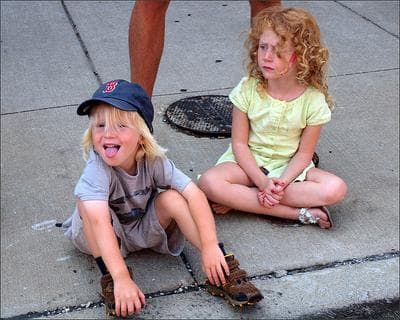Advertisement
Study: Higher Risk Of Abuse For Kids Who Don't Conform To Gender

New research out today from the Harvard School of Public Health and published in the journal Pediatrics has found that children who don't "conform" to their gender are more likely to have suffered childhood abuse (physical, sexual and psychological) and to have a risk of post-traumatic stress disorder (PTSD) in early adulthood.
Researchers analyzed data from nearly 9,500 young adults (mostly in their 20s, part of the Growing Up Today study) and asked them to recall events from early childhood, when they were younger than 11.
Defining "Gender Nonconformity"
Participants were asked behavior-based questions "regarding media characters imitated or admired, roles taken in pretend play, favorite toys and games, and feelings of femininity or masculinity."
For example, if a girl (biological sex = female), pretended to be the prince slaying the dragon (gender role/identity = masculine) rather than the princess sashaying through the forest (gender role/identity = feminine), that'd be an instance of gender nonconformity.
Participants were divided by biological sex and then into three groups based on the median gender nonconformity score within each sex (the score that's in the middle of all the scores). This means gender nonconformity is on sex-specific, relative scale — gender nonconforming behaviors are understood only in the context of what other males or other females are doing rather than determined by an absolute cutoff score.
The three groups used for analysis were:
- at or below the median (relatively less gender nonconforming)
- above the median but not in the top 10% (relatively more gender nonconforming)
- the top 10% (the most gender nonconforming)
Results
Sometimes a study only looks at a certain segment of the population, so it's difficult to generalize the results to a larger population. In this study, participants were mostly white (so the findings aren't readily applicable to minority populations) — but they were mostly heterosexual too. Lead author Andrea Roberts pointed out that most of the research done in gender expression uses a sample of gay/lesbian participants, but with a mostly heterosexual sample in this study, the results can be generalized to the wider population more easily.
Roberts and her team found that — for both males and females, regardless of future sexual orientation — childhood and teenage abuse and early adulthood PTSD were more prevalent in those who displayed the most gender nonconforming behaviors (the top 10%) when they were kids (compared to those in the bottom half of the gender nonconformity spectrum).
Abuse included physical, psychological and sexual abuse. Men who were the most gender nonconforming as kids were almost three times more likely to have suffered sexual abuse as children. Women were 60% more likely — but Roberts reminded me that it's important to remember that women are more likely to suffer sexual abuse in general.
From the press release:
Men who ranked in the top 10th percentile of childhood gender nonconformity reported a higher prevalence of sexual and physical abuse before age 11 and psychological abuse between ages 11 and 17 compared with those below the median of nonconformity. Women in the top 10th percentile reported a higher prevalence of all forms of abuse as children compared with those below the median of nonconformity. Rates of PTSD were almost twice as high among young adults who were gender nonconforming in childhood than among those who were not.
Going Forward
Roberts and her team foresee the potential for doctor, family and school based interventions that seek to identify kids who display gender nonconforming behaviors, thereby helping to prevent, stop or treat abuse.
On the phone, Roberts reflected, "We want all children to be treated well — we don’t want children to be stigmatized or bullied. The discrimination against kids who behave differently can have lasting effects on health."
More resources:
- Sex vs. Gender (from the World Health Organization)
- Gender & Gender Identity (from Planned Parenthood)
- Born This Way (a photo/essay project for gay adults to reflect on their childhood selves)
This program aired on February 20, 2012. The audio for this program is not available.